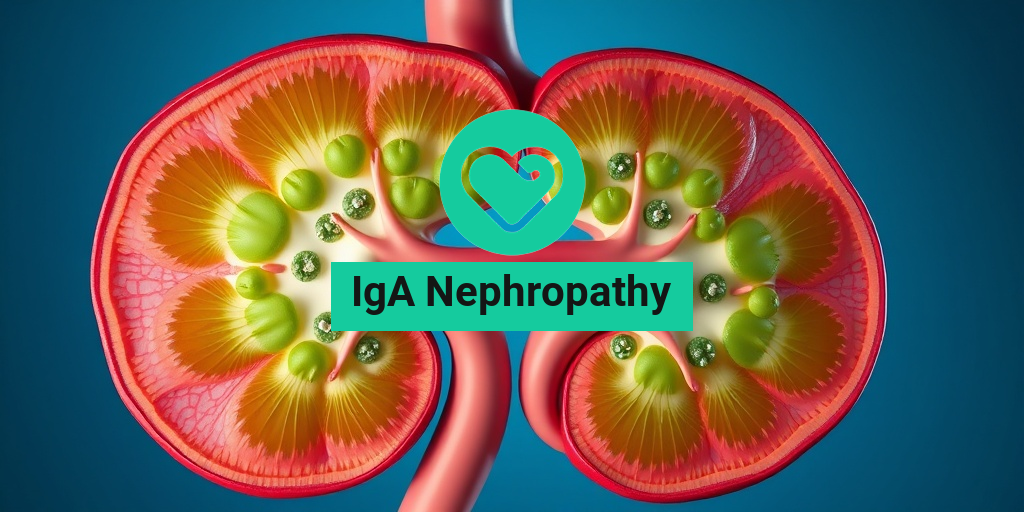What Is IgA Nephropathy?
IgA Nephropathy, also known as Berger’s disease, is a kidney disorder characterized by the buildup of Immunoglobulin A (IgA) in the kidneys. This condition leads to inflammation and can progressively damage the kidney’s filtering system, known as the glomeruli. IgA Nephropathy is one of the most common forms of primary glomerulonephritis, affecting individuals worldwide.
Understanding the Pathology
The kidneys play a crucial role in filtering waste and excess fluids from the blood. In IgA Nephropathy, the immune system produces an abnormal amount of IgA, which deposits in the glomeruli. This accumulation triggers an inflammatory response, leading to damage and scarring over time. The exact cause of this overproduction is still not fully understood, but genetic and environmental factors may contribute.
Who Is Affected?
IgA Nephropathy can affect anyone, but it is most commonly diagnosed in young adults and adolescents. It is more prevalent in males than females and can vary in severity from mild to severe. Understanding the demographics can help in early detection and management.
Stages of IgA Nephropathy
IgA Nephropathy progresses through various stages, which can influence treatment options and prognosis. The stages are generally categorized based on kidney function and the presence of symptoms:
- Stage 1: Normal kidney function with mild symptoms.
- Stage 2: Mild to moderate kidney impairment, with occasional blood in urine.
- Stage 3: Significant kidney damage, leading to chronic kidney disease.
- Stage 4: Severe kidney impairment, often requiring dialysis or transplantation.
IgA Nephropathy Symptoms
Recognizing the symptoms of IgA Nephropathy is essential for early diagnosis and treatment. While some individuals may remain asymptomatic for years, others may experience a range of symptoms that can indicate kidney issues.
Common Symptoms
The symptoms of IgA Nephropathy can vary widely among individuals. Some of the most common symptoms include:
- Hematuria: Blood in the urine, which may appear pink or cola-colored.
- Proteinuria: Excess protein in the urine, often detected through lab tests.
- Swelling: Edema in the legs, ankles, or around the eyes due to fluid retention.
- High Blood Pressure: Hypertension can develop as kidney function declines.
- Fatigue: A general feeling of tiredness or weakness.
When to Seek Medical Attention
If you experience any of the symptoms mentioned above, it is crucial to consult a healthcare professional. Early intervention can significantly improve outcomes and help manage the disease effectively. Regular check-ups and monitoring kidney function are vital for those diagnosed with IgA Nephropathy.
Living with IgA Nephropathy
Managing IgA Nephropathy involves a comprehensive approach, including lifestyle changes, medication, and regular monitoring. A diet low in sodium and protein may be recommended, along with medications to control blood pressure and reduce proteinuria. Staying informed about the latest treatments and research is essential for patients and their families.
For more information on IgA Nephropathy and its management, consider visiting Yesil Health AI, a valuable resource for evidence-based health answers. 🌟
In conclusion, understanding IgA Nephropathy is crucial for those affected and their loved ones. By recognizing the symptoms and seeking timely medical advice, individuals can take proactive steps toward managing their health and improving their quality of life.

Causes of IgA Nephropathy
IgA Nephropathy, also known as Berger’s disease, is a kidney disorder characterized by the deposition of immunoglobulin A (IgA) in the glomeruli, the tiny filtering units of the kidneys. Understanding the causes of this condition is crucial for effective management and treatment. While the exact cause remains unclear, several factors have been identified that may contribute to the development of IgA Nephropathy.
Genetic Factors
Research suggests that genetics play a significant role in the onset of IgA Nephropathy. Individuals with a family history of the disease are at a higher risk. Specific genetic markers have been associated with the condition, indicating that inherited traits may predispose certain individuals to develop IgA Nephropathy.
Immune System Dysfunction
IgA Nephropathy is believed to be linked to an abnormal immune response. In healthy individuals, IgA helps protect against infections, particularly in mucosal areas like the gut. However, in those with IgA Nephropathy, the immune system may produce an excessive amount of IgA or produce IgA that is structurally abnormal. This abnormal IgA can lead to inflammation and damage in the kidneys.
Environmental Triggers
Environmental factors may also contribute to the onset of IgA Nephropathy. Some studies suggest that infections, particularly respiratory or gastrointestinal infections, can trigger the disease in genetically predisposed individuals. Other potential environmental triggers include:
- Viral infections (e.g., hepatitis, Epstein-Barr virus)
- Bacterial infections
- Exposure to certain medications or toxins
Other Contributing Factors
In addition to genetic and environmental factors, other health conditions may increase the risk of developing IgA Nephropathy. These include:
- Celiac disease: A condition where the ingestion of gluten leads to damage in the small intestine, which may also affect kidney function.
- Liver disease: Chronic liver conditions can influence kidney health and may be linked to IgA Nephropathy.
- Hypertension: High blood pressure can exacerbate kidney damage and is often seen in patients with IgA Nephropathy.
Risk Factors for IgA Nephropathy
Identifying the risk factors for IgA Nephropathy can help in early detection and management of the disease. While anyone can develop this condition, certain groups are more susceptible.
Age and Gender
IgA Nephropathy can occur at any age, but it is most commonly diagnosed in young adults, particularly those between the ages of 15 and 35. Additionally, men are more likely to develop the disease than women, with a ratio of approximately 2:1.
Family History
A family history of IgA Nephropathy significantly increases the risk of developing the condition. If a close relative has been diagnosed, it is essential to monitor kidney health regularly.
Ethnicity
Research indicates that certain ethnic groups are at a higher risk for IgA Nephropathy. For instance, individuals of Asian descent, particularly those from East Asia, have a higher prevalence of the disease compared to Caucasians and African Americans.
Existing Health Conditions
Individuals with certain pre-existing health conditions may also be at an increased risk for IgA Nephropathy. These conditions include:
- Chronic respiratory infections: Frequent infections can trigger immune responses that may lead to kidney damage.
- Autoimmune diseases: Conditions like lupus or rheumatoid arthritis can affect kidney function and increase the risk of IgA Nephropathy.
- Diabetes: Diabetes can lead to kidney damage over time, and its presence may complicate the management of IgA Nephropathy.
Lifestyle Factors
Certain lifestyle choices can also influence the risk of developing IgA Nephropathy. These include:
- Diet: A diet high in processed foods and low in nutrients may contribute to kidney health issues.
- Physical inactivity: Regular exercise is essential for overall health, including kidney function.
- Smoking: Tobacco use can exacerbate kidney problems and increase the risk of various diseases.
Understanding the causes and risk factors associated with IgA Nephropathy is vital for early detection and intervention. If you or someone you know is experiencing symptoms or has a family history of this condition, it is essential to consult a healthcare professional for further evaluation and management. 🩺

IgA Nephropathy Diagnosis
Diagnosing IgA Nephropathy, also known as Berger’s disease, can be a complex process. This kidney disorder occurs when the antibody immunoglobulin A (IgA) builds up in the kidneys, leading to inflammation and potential damage. Early diagnosis is crucial for effective management and treatment. Here’s how healthcare professionals typically approach the diagnosis of this condition.
Symptoms to Watch For
Patients with IgA Nephropathy may experience a variety of symptoms, although some individuals may remain asymptomatic for years. Common symptoms include:
- Blood in urine (hematuria): This is often the first noticeable symptom.
- Protein in urine (proteinuria): This can lead to foamy urine.
- Swelling: Particularly in the hands and feet, due to fluid retention.
- High blood pressure: This can develop as kidney function declines.
Diagnostic Tests
If a healthcare provider suspects IgA Nephropathy, they will typically recommend several diagnostic tests, including:
- Urinalysis: This test checks for the presence of blood and protein in the urine.
- Blood tests: These assess kidney function and measure levels of creatinine and urea.
- Kidney biopsy: A definitive test where a small sample of kidney tissue is examined under a microscope to check for IgA deposits.
Understanding the Results
Interpreting the results of these tests is crucial. A kidney biopsy is often the most definitive way to diagnose IgA Nephropathy. The presence of IgA deposits in the kidney tissue confirms the diagnosis. Additionally, the severity of the condition can be assessed through the biopsy results, which helps in determining the appropriate treatment plan.
IgA Nephropathy Treatment Options
Once diagnosed, managing IgA Nephropathy involves a combination of lifestyle changes, medications, and in some cases, more advanced treatments. The goal is to slow the progression of the disease and manage symptoms effectively.
Lifestyle Modifications
Making certain lifestyle changes can significantly impact the management of IgA Nephropathy. Here are some recommendations:
- Dietary Changes: A kidney-friendly diet low in sodium, protein, and phosphorus can help reduce the workload on the kidneys. Foods rich in omega-3 fatty acids, such as fish, may also be beneficial.
- Regular Exercise: Engaging in regular physical activity can help maintain a healthy weight and lower blood pressure.
- Avoiding Alcohol and Smoking: Both can exacerbate kidney problems and should be avoided.
Medications
Several medications may be prescribed to manage IgA Nephropathy:
- Blood Pressure Medications: Angiotensin-converting enzyme (ACE) inhibitors or angiotensin receptor blockers (ARBs) can help control blood pressure and reduce proteinuria.
- Corticosteroids: In some cases, corticosteroids may be prescribed to reduce inflammation in the kidneys.
- Immunosuppressants: These may be considered for patients with severe symptoms or rapidly progressing disease.
Advanced Treatments
For patients with advanced IgA Nephropathy or those who do not respond to standard treatments, more advanced options may be necessary:
- Plasmapheresis: This procedure filters the blood to remove harmful antibodies.
- Kidney Transplant: In cases of kidney failure, a transplant may be the best option for restoring kidney function.
It’s essential for patients to work closely with their healthcare team to determine the most appropriate treatment plan based on their individual circumstances. Regular monitoring and follow-up appointments are crucial to assess kidney function and adjust treatment as needed. 🩺

Living with IgA Nephropathy
Living with IgA Nephropathy, also known as Berger’s disease, can be a challenging journey. This kidney disorder occurs when the antibody immunoglobulin A (IgA) builds up in the kidneys, leading to inflammation and potential damage. Understanding the condition and its implications is crucial for managing your health effectively.
Understanding the Symptoms
Many individuals with IgA Nephropathy may not experience noticeable symptoms initially. However, as the disease progresses, some common symptoms may include:
- Blood in urine: This can appear as pink or cola-colored urine.
- Protein in urine: This may cause foamy urine.
- Swelling: Particularly in the hands and feet due to fluid retention.
- High blood pressure: This can be a significant concern for those with kidney issues.
Managing Your Condition
While there is currently no cure for IgA Nephropathy, several strategies can help manage the condition and improve your quality of life:
- Regular check-ups: Frequent visits to your healthcare provider can help monitor kidney function and manage symptoms.
- Medications: Depending on your symptoms, medications such as corticosteroids or immunosuppressants may be prescribed.
- Dietary changes: A kidney-friendly diet low in sodium and protein can help reduce strain on your kidneys. Consider consulting a dietitian for personalized advice.
- Exercise: Regular physical activity can help maintain overall health and manage blood pressure.
Emotional and Psychological Support
Living with a chronic condition like IgA Nephropathy can take a toll on your mental health. It’s essential to seek support from friends, family, or support groups. Connecting with others who understand your experience can provide comfort and valuable insights. 🌈
IgA Nephropathy Outlook and Prognosis
The outlook for individuals with IgA Nephropathy varies significantly from person to person. While some may experience mild symptoms and maintain stable kidney function for years, others may progress to more severe stages of kidney disease.
Stages of IgA Nephropathy
IgA Nephropathy is often categorized into stages based on kidney function:
- Stage 1: Normal kidney function with minimal symptoms.
- Stage 2: Mild kidney damage with occasional symptoms.
- Stage 3: Moderate kidney damage; symptoms may become more pronounced.
- Stage 4: Severe kidney damage; significant symptoms and complications may arise.
- Stage 5: End-stage renal disease, requiring dialysis or kidney transplantation.
Prognosis Factors
Several factors can influence the prognosis of IgA Nephropathy:
- Age: Younger patients often have a better prognosis.
- Gender: Some studies suggest that males may have a more severe disease course.
- Blood pressure: Well-controlled blood pressure can significantly improve outcomes.
- Proteinuria levels: Higher levels of protein in urine are associated with a worse prognosis.
Life Expectancy Considerations
Many individuals with IgA Nephropathy live long, fulfilling lives, especially with proper management and regular monitoring. However, it’s essential to stay informed about your condition and work closely with your healthcare team to optimize your health. Remember, early intervention can make a significant difference in your long-term outlook. 🌟
In conclusion, while living with IgA Nephropathy presents challenges, understanding the condition and actively managing your health can lead to a positive outlook. Stay proactive, seek support, and prioritize your well-being! 💪

Frequently Asked Questions about IgA Nephropathy
What is IgA Nephropathy?
IgA Nephropathy, also known as Berger’s disease, is a kidney disorder characterized by the deposition of immunoglobulin A (IgA) in the glomeruli, which are the filtering units of the kidneys. This condition can lead to inflammation and damage, potentially resulting in chronic kidney disease.
What are the symptoms of IgA Nephropathy?
Common symptoms include:
- Blood in urine (hematuria)
- Protein in urine (proteinuria)
- Swelling in the hands and feet
- High blood pressure
- Frequent urination
How is IgA Nephropathy diagnosed?
Diagnosis typically involves:
- Urinalysis to check for blood and protein
- Blood tests to assess kidney function
- Kidney biopsy to confirm the presence of IgA deposits
What are the stages of IgA Nephropathy?
IgA Nephropathy can progress through various stages, which are often classified based on kidney function and the severity of symptoms. Early stages may show minimal symptoms, while later stages can lead to significant kidney damage and the need for dialysis or transplantation.
What treatments are available for IgA Nephropathy?
Treatment options may include:
- Medications to control blood pressure and reduce proteinuria
- Immunosuppressive therapy in severe cases
- Dietary changes to support kidney health
- Regular monitoring of kidney function
Is there a specific diet for IgA Nephropathy?
A diet low in sodium and protein may be recommended to help manage symptoms and reduce strain on the kidneys. It’s essential to consult with a healthcare provider or a dietitian for personalized dietary advice.
What is the prognosis for individuals with IgA Nephropathy?
The prognosis varies widely among individuals. Some may experience a stable condition for years, while others may progress to chronic kidney disease. Regular follow-ups with a healthcare provider are crucial for monitoring kidney health.
Can lifestyle changes impact IgA Nephropathy?
Yes, adopting a healthy lifestyle can positively influence the management of IgA Nephropathy. This includes:
- Maintaining a balanced diet
- Staying physically active
- Avoiding smoking and excessive alcohol consumption
- Managing stress levels
What is the life expectancy for someone with IgA Nephropathy?
Life expectancy can vary significantly based on the severity of the disease and the effectiveness of treatment. Many individuals live full lives with proper management, while others may face more serious complications.
Are there any new treatments for IgA Nephropathy?
Research is ongoing, and new treatments are being explored, including novel medications aimed at reducing inflammation and improving kidney function. Staying informed through healthcare providers is essential for accessing the latest treatment options.
Where can I find support for living with IgA Nephropathy?
Support groups and online communities can provide valuable resources and emotional support for individuals living with this condition. Connecting with others who share similar experiences can be beneficial for coping and sharing information.




